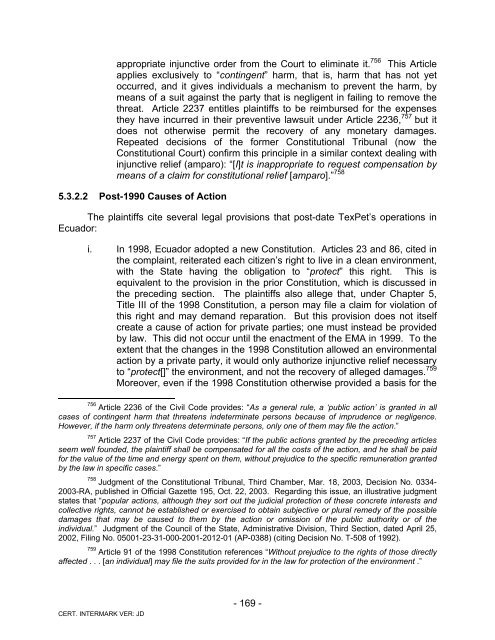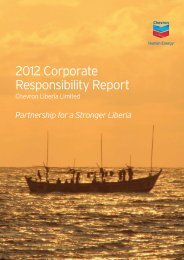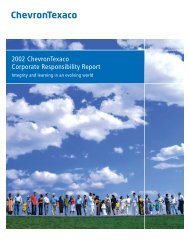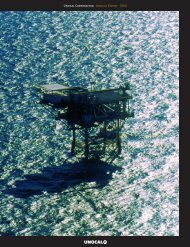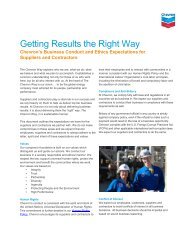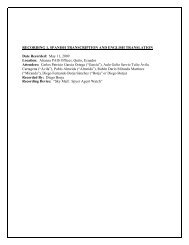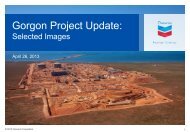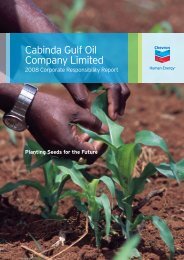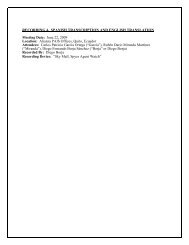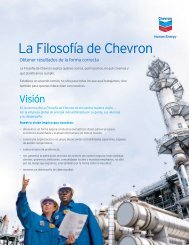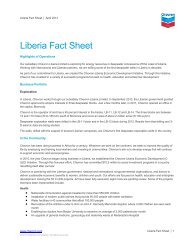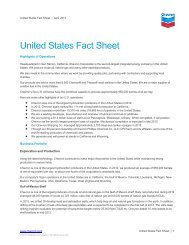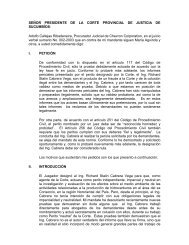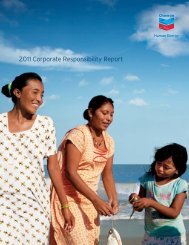-i- TO THE SUBROGATE PRESIDENT OF THE ... - Chevron
-i- TO THE SUBROGATE PRESIDENT OF THE ... - Chevron
-i- TO THE SUBROGATE PRESIDENT OF THE ... - Chevron
You also want an ePaper? Increase the reach of your titles
YUMPU automatically turns print PDFs into web optimized ePapers that Google loves.
appropriate injunctive order from the Court to eliminate it. 756 This Article<br />
applies exclusively to “contingent” harm, that is, harm that has not yet<br />
occurred, and it gives individuals a mechanism to prevent the harm, by<br />
means of a suit against the party that is negligent in failing to remove the<br />
threat. Article 2237 entitles plaintiffs to be reimbursed for the expenses<br />
they have incurred in their preventive lawsuit under Article 2236, 757 but it<br />
does not otherwise permit the recovery of any monetary damages.<br />
Repeated decisions of the former Constitutional Tribunal (now the<br />
Constitutional Court) confirm this principle in a similar context dealing with<br />
injunctive relief (amparo): “[I]t is inappropriate to request compensation by<br />
means of a claim for constitutional relief [amparo].” 758<br />
5.3.2.2 Post-1990 Causes of Action<br />
The plaintiffs cite several legal provisions that post-date TexPet’s operations in<br />
Ecuador:<br />
i. In 1998, Ecuador adopted a new Constitution. Articles 23 and 86, cited in<br />
the complaint, reiterated each citizen’s right to live in a clean environment,<br />
with the State having the obligation to “protect” this right. This is<br />
equivalent to the provision in the prior Constitution, which is discussed in<br />
the preceding section. The plaintiffs also allege that, under Chapter 5,<br />
Title III of the 1998 Constitution, a person may file a claim for violation of<br />
this right and may demand reparation. But this provision does not itself<br />
create a cause of action for private parties; one must instead be provided<br />
by law. This did not occur until the enactment of the EMA in 1999. To the<br />
extent that the changes in the 1998 Constitution allowed an environmental<br />
action by a private party, it would only authorize injunctive relief necessary<br />
to “protect[]” the environment, and not the recovery of alleged damages. 759<br />
Moreover, even if the 1998 Constitution otherwise provided a basis for the<br />
756 Article 2236 of the Civil Code provides: “As a general rule, a ‘public action’ is granted in all<br />
cases of contingent harm that threatens indeterminate persons because of imprudence or negligence.<br />
However, if the harm only threatens determinate persons, only one of them may file the action.”<br />
757 Article 2237 of the Civil Code provides: “If the public actions granted by the preceding articles<br />
seem well founded, the plaintiff shall be compensated for all the costs of the action, and he shall be paid<br />
for the value of the time and energy spent on them, without prejudice to the specific remuneration granted<br />
by the law in specific cases.”<br />
758 Judgment of the Constitutional Tribunal, Third Chamber, Mar. 18, 2003, Decision No. 0334-<br />
2003-RA, published in Official Gazette 195, Oct. 22, 2003. Regarding this issue, an illustrative judgment<br />
states that “popular actions, although they sort out the judicial protection of these concrete interests and<br />
collective rights, cannot be established or exercised to obtain subjective or plural remedy of the possible<br />
damages that may be caused to them by the action or omission of the public authority or of the<br />
individual.” Judgment of the Council of the State, Administrative Division, Third Section, dated April 25,<br />
2002, Filing No. 05001-23-31-000-2001-2012-01 (AP-0388) (citing Decision No. T-508 of 1992).<br />
759 Article 91 of the 1998 Constitution references “Without prejudice to the rights of those directly<br />
affected . . . [an individual] may file the suits provided for in the law for protection of the environment .”<br />
CERT. INTERMARK VER: JD<br />
- 169 -


